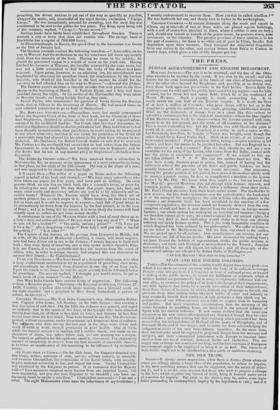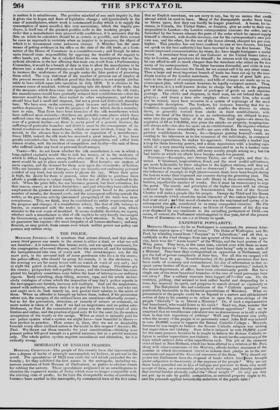THE SILK TRADE.
GLOBE—It always seems ungracious, when there is distress (from whatever cause prevailing) among a large class of the population, to refuse to inquire, in the most searching manner that can be suggested, into the means of reliev- ing it and it is on this very account that those who wish to propose a change in the laws which regulate any branch of trade, bring it forward under cover of a motion for inquiry. But great as the distress may be, unless some legis- lative proceeding be contemplated, inquiry by the legislature is vain; and if it is useless it is mischievous. The positive mischief of any such inquiry is, that it gives rise to hopes and fears of legislative change • and (particularly in the case of manufactures, where work is commenced to-day which is to supply the consumptien of many months) this very uncertainty, which the inquiry pro- dikes' is itself one of the greatest positive evils to the working people. In order that a manufacturer may proceed with confidence, it is necessary that the data on which he calculates should be as certain as possible, and there cannot be even an approach to certainty when an inquiry is in progress, the object of which is to recommend some unknown change. A Minister has the same means of getting evidence in his office on the state of the silk trade, as a Com- mittee of the House of Commons in a committee-room ; and though he takes upon himself some responsibility by opposing the transfer of the inquiry to other hands, yet, when he is satisfied frdm his own investigation that no be- neficial alteration in the law affecting.that trade can result from a Parliamentary Committee, it would be a breach of duty-in him to allow the manufacture to be thrown into a state of uncertainty—it would.be a gross breach of duty in him to increase the misfortunes of the people under the false pretext of procuring them relief. The very. 'statement of the number of persons out of employ at the present moment is a sufficient proof that the distress is not mainly attribu- table to laws which came into operation in July 1826. It is obvious to the common sense of mankind, without inquiring into the details of the trade, that if the measures which then came into operation Were ruinous to the silk trade, Ae manufacturers would have gradually reduced their establishments--sthat the weavers would by this time have turned to other employments, and that we should have had a small and stagnant, but not a great and distressed, manufac- ture. We have seen, on the contrary, great increase and activity followed by sudden depression. This is not the progress of laws which doom a manufac- ture to ruin. That there have been branches of the silk manufacture which have suffered most seriously—that there are probably some places which have suffered since. the measures of 1826, we believe ; but as there is no proof what- ever of a general decline—as there is every proof of a general increase, the sufferings of particular branches and districts must be the consequence of in- ternal revolutions in the manufacture, which are more incident, it may be ob- served, to the advance than to the decline or stagnation of a manufacture. Since 1824, indeed, the silk trade has received a great impulse; it has been greatly extended—has been the scene of great competition, and called forth intense rivalry, with the incident of competition and rivalry—the ruin of those who suffered under any local or personal disadvantages.
Times—We do not know whether the silk manufacture is one in which a long-sighted capitalist would like to risk his money, or in the tendency of which to diffuse happiness among those who carry it on a cautious Govern- ment would be apt to place much confidence. Most luxuries are matters of mere caprice, and the demand for them rests upon the vicissitudes of fashion. Silks are luxuries all over Europe,--they arc luxuries not embracing personal comfort of any kind, but merely serve to please the eye. When their price is high, the desire for them is general, since the ability to purchase them affords a gratification to vulgar vanity ; but the use of theni is confined to the rich. When the price falls, the use becomes general, but their estimation, for that reason, ceases, or at least diminishes ; and just when they have called into employment the greatest amount of industry, and given bread to the greatest number of mouths, the demand cools, and the consequent suffering spreada the wider, as the previous activity (misnamed prosperity) of the trade was more conspicuous. This, we think, may be considered no unfair representation of the progress and chanaes of a manufacture which, like that of silk, belongs to luxury, as contrasted with the trades in cotton, woollen, and iron, which minister to the real wants of mankind. It seems doubtful, therefore, we repeat, whether such a manufacture*as that of silk ought to be very keenly encouraged by Government, er treated with more than a tacit attention. It has, at best, no guarantee but caprice—the must irregular of all human attributes; and may flourish, or may perish, from causes over which neither power nor policy can possess any certain sway.



















 Previous page
Previous page